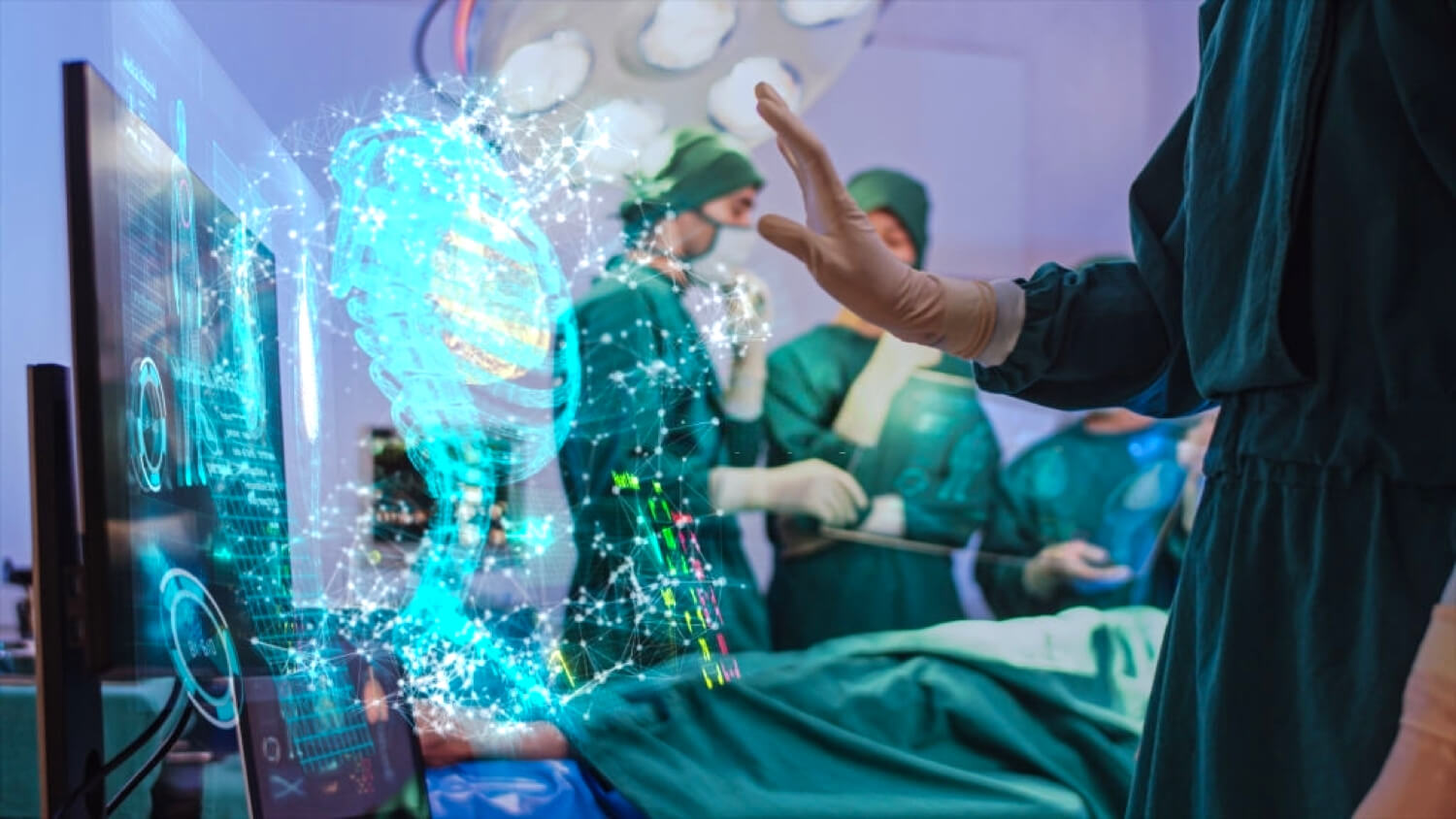Artificial Intelligence and Machine Learning have managed to penetrate most industries in multiple aspects, and although most suggestions for the way forward have been regarding improvements in tech, particularly concerning automation, one industry that has far-reaching implications with the introduction of AI would be healthcare. The ideal future holds the possibility of patients walking in and out of diagnosis with zero paperwork or physical transactions.

Current State
AI and machine learning are already transforming healthcare as we speak. With precise, efficient, timely, and impactful interventions in the diagnostic process, AI has already established itself as a potentially powerful tool in healthcare.
The most common thread across most medical conditions, be it chronic diseases or cancer, is data. The complexity and volume of the data available in healthcare empower AI in several different ways, from predicting outcomes to assessing risks or even deducing conditional dependencies.
“Financially, the economic world seems to realize the importance of AI in healthcare. In 2020, the global AI in the healthcare market was valued at 4.9 billion USD, with AI-based healthcare startups raising over 2.5 billion USD in 2021. By 2024, that number is expected to grow almost tenfold to 45.2 billion USD, with a compound annual growth rate of close to 45%, and by 2026, it would have saved more than its own worth in terms of finances.”
In terms of practical applications, AI is not (and might never be) capable of replacing human involvement, aka doctors and nurses. However, AI is being actively deployed across several other areas of healthcare.
Applications of AI in Healthcare:
Predicting Disease Outbreaks
Technologies to monitor data and predict disease outbreaks already exist. This is often done using real-time data sources (social media, historical online information, and so on). Malaria outbreaks have been predicted with artificial neural networks by analyzing rainfall, temperature, number of cases, and so on.
Personalized Treatment and Behavioral Consultation
The Low Carb Program (a digital therapy from Diabetes Digital Media) helps people with type 2 diabetes and prediabetes to reverse their condition and place them into remission. The app tracks the users’ health and offers personalized education by simultaneously learning from individual users and monitoring the wider community’s progress. Most members who complete the program reduce medication dependency, annually saving over 1000 USD per patient in medication “deprescription”. The app also places the condition into remission for 26% of its users who complete the program.
Drug Discovery
The use of machine learning in preliminary drug discovery can conduct initial screening of drug compounds, or predict success rates of drugs based on biological factors. This includes R&D discovery technologies (for instance, next-generation sequencing). These drugs don’t need to be pharmacological in their appearance either. Digital technology and the amount of real-world patient data used for it are providing solutions to conditions that were previously regarded as chronic and progressive.
Provision of Follow-Up Care
Hospital readmittance is a big challenge in healthcare. Doctors and governments struggle to keep patients healthy after returning home post hospital treatment. Several organizations have developed digital health coaches such as automated chatbots on websites, but with set reminders. The assistant gets fed information about the patient’s medications and reminds them to take the medicine, asks them about their symptoms if any, and conveys any relevant findings to the doctor.
Optimizing and streamlining healthcare processes, infrastructure, and procedures with AI is no longer limited to just medical facilities. Many healthcare companies are actively researching and developing tools and solutions such as reducing documentation-related workload, that make healthcare easier for both patients and care providers.
AI-based companies have now begun providing tools such as smart assistants and speech services to alleviate the administrative workload of doctors, preventing them from physical burnout. Two things promise to make these tools safer and more efficient over time: Healthcare laws such as HIPAA, and inputs from technicians, clinicians, and medical personnel.

Challenges For AI In Healthcare
There is always a list of challenges to be encountered with any new technology, and integrating AI into healthcare is no different.
Unconsolidated Data
Healthcare data currently exist across devices and platforms, instead of being available in one place. Patients collect data on their phones, smartwatches, pedometers, and other fitness accessories, while physicians sporadically collect biomarker and demographic data. This data is never merged as part of the patient experience to paint a larger picture, and there are no organizations or institutions dedicated to combining, studying, and analyzing this data either. In addition, electronic health records (EHRs) currently exist across databases in a highly disorganized manner, requiring urgent digitizing.
Information Security and Data Governance
Medical data is supposed to be personal, confidential, and secure. The public is generally reluctant to share their data with third parties even anonymously, because of privacy concerns. Adhering to multiple sets of regulations makes disaster recovery and security the primary importance, and network infrastructure plays a critical role in ensuring this. Healthcare organizations need a network infrastructure upgrade to prepare them for the best patient care possible.
Additionally, the creation of newer laws, bills, and regulatory bodies (or at least updating the existing ones) might be required to lay down the legality of this information’s governance.
What The Near Future Holds
Artificially intelligent agents or tools might never be able to replace doctors and nurses, but we’ve started scratching the surface of personalized automated healthcare. From doctors, AI should ideally move on to the next level of automation, and make paperwork easier for personnel who aren’t necessarily doctors but are still very integral to healthcare infrastructure. Imagine companies with clear AI experience that develop tools to minimize the administrative work of nurses, letting them focus on the more important aspects of their job, such as one-on-one interactions with patients. This could exponentially scale up healthcare infrastructure, minimizing consultation time, increasing the number of patients who can be offered healthcare, and making medical assistance more holistic.
CodeGlo has rich experience in the AI industry and we have been working on a handful of exciting long term projects in the field. We would be more than happy to provide consultation on your AI-based projects, healthcare or otherwise. Contact us now.





